Abstract
BACKGROUND. Formal efforts to recruit smokers into cessation programs have failed to reach large segments of the smoking population. Telephone intervention may represent a viable strategy to promote smoking cessation. An even more promising approach may be a combination of brief telephone support and outreach to identified smokers. METHODS. Telephone support for smoking cessation was provided to four identified smoker populations in Bloomington, Minn, one of three Minnesota Heart Health Program education communities. Smokers were randomly assigned to an intervention consisting of two 15-minute telephone calls approximately 1 to 3 weeks apart or to a nonintervention control. RESULTS. At the 6-month follow-up, a significant overall effect was found in favor of the intervention condition for both self-reported and cotinine-validated quitting. Differences between intervention and control conditions were no longer significant at 18 months. CONCLUSIONS. Smokers' receptivity to telephone intervention was at least moderately encouraging. The cost of intervention could be relatively low if trained volunteers initiated telephone calls. However, more intensive telephone intervention and support may be needed to produce lasting changes in smoking prevalence.
Full text
PDF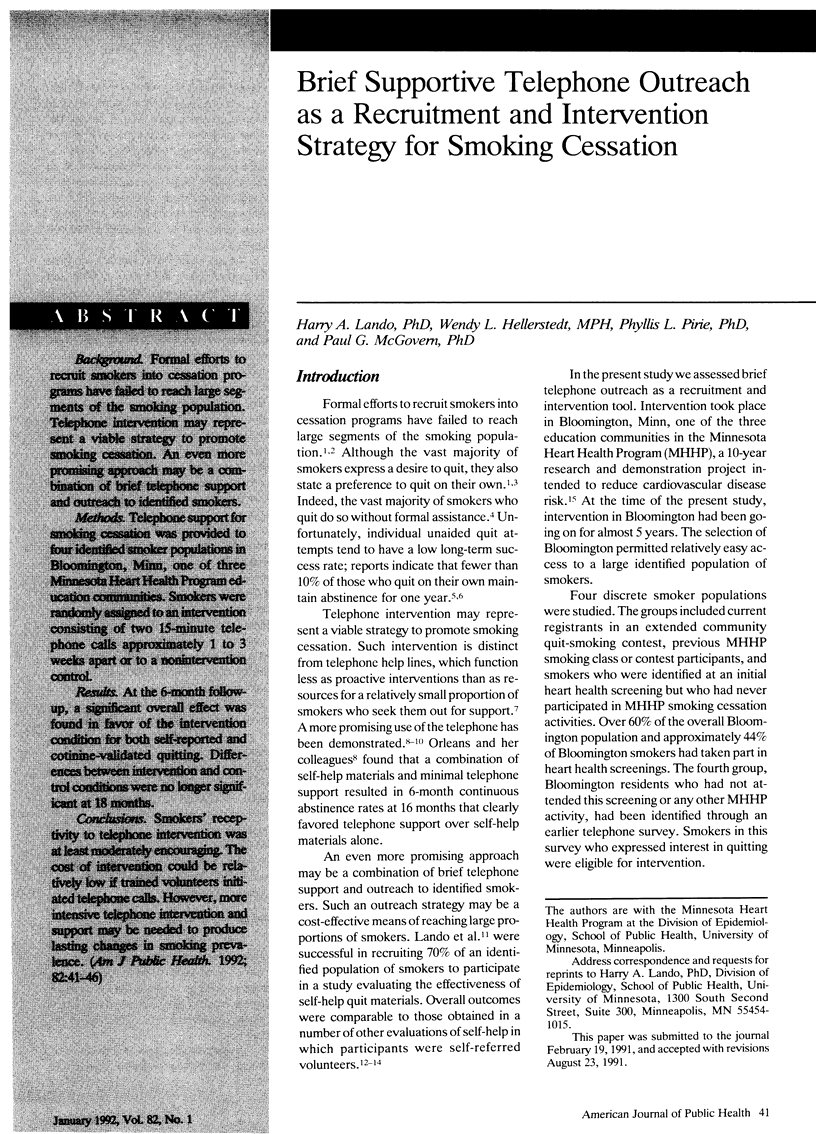
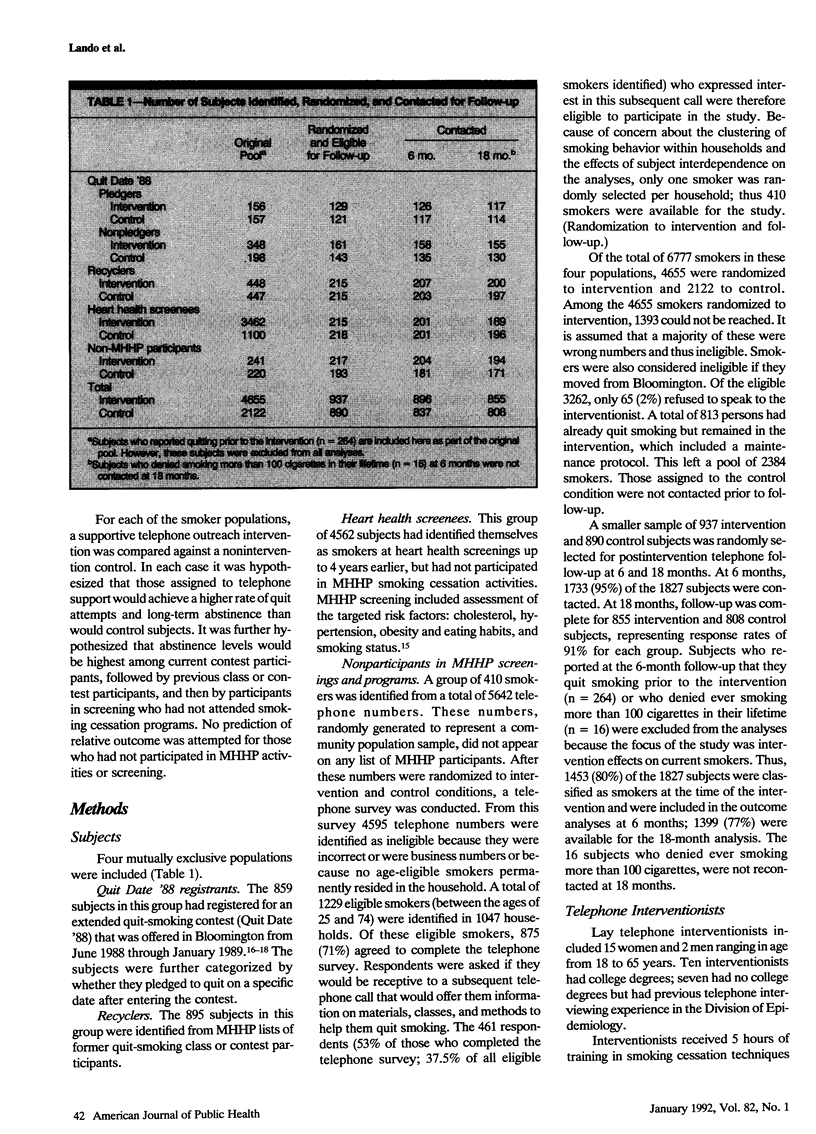
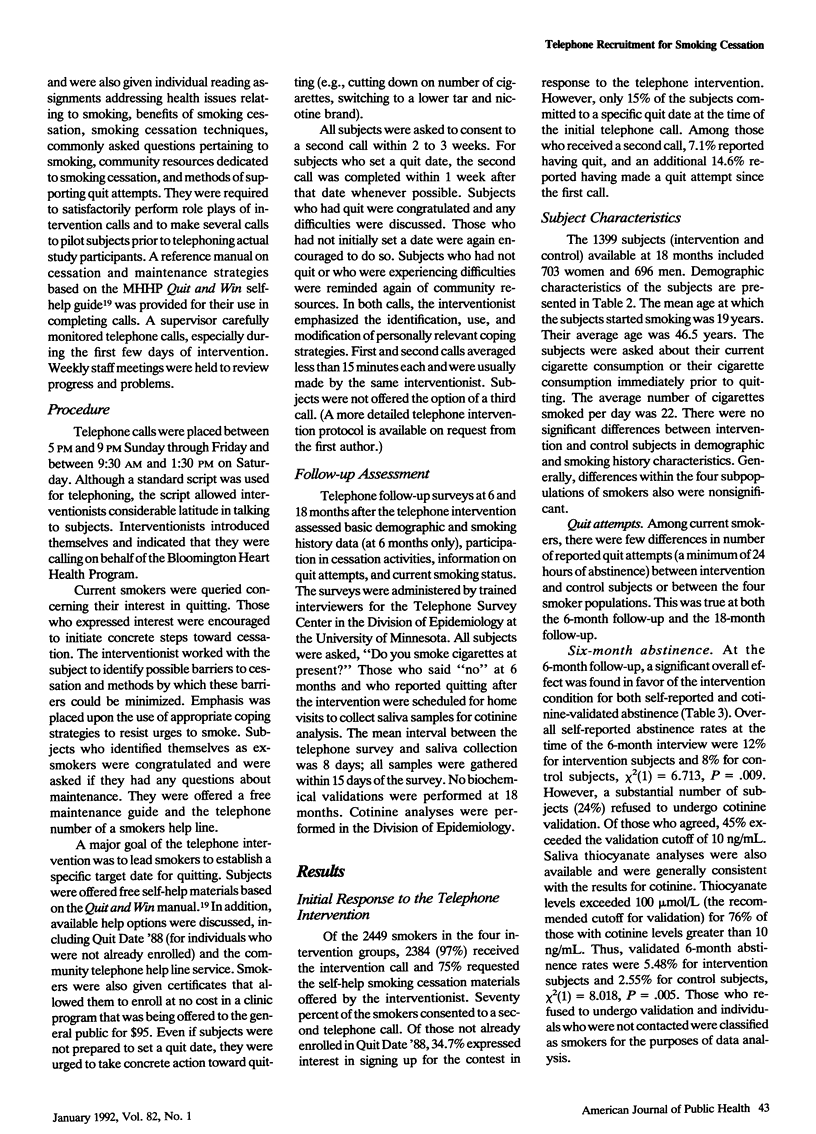
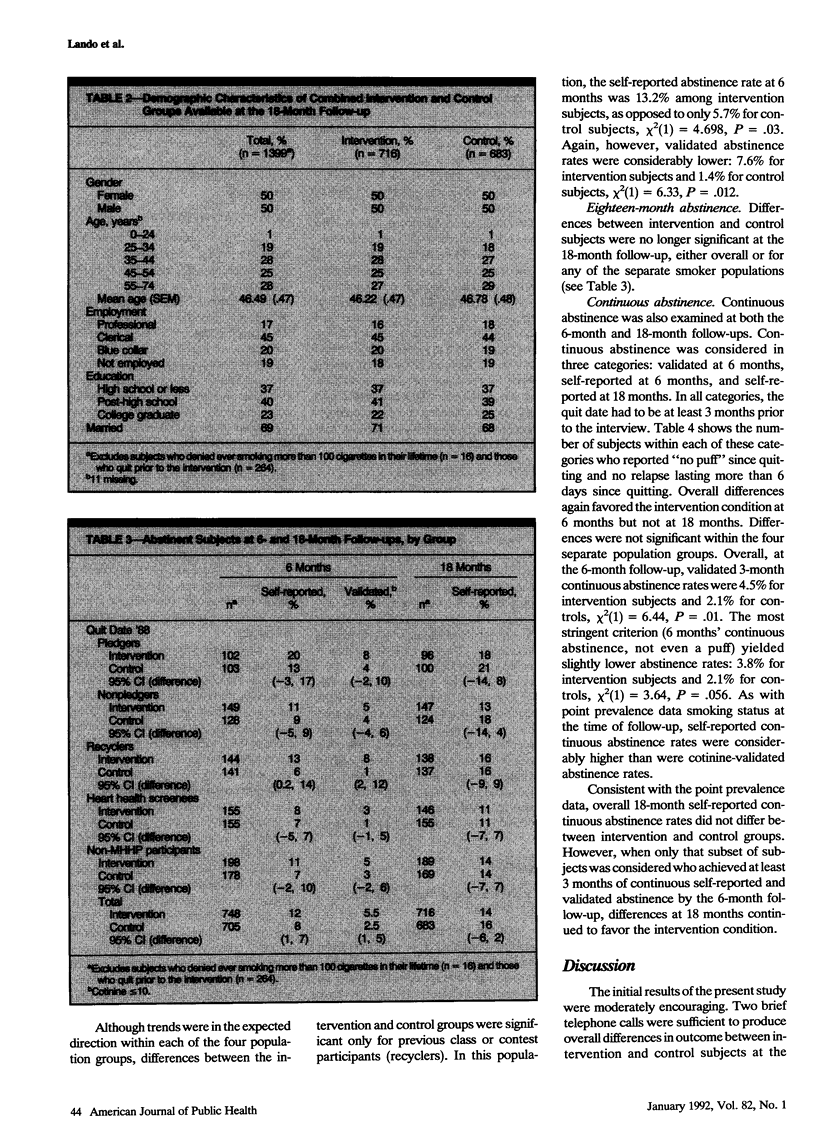
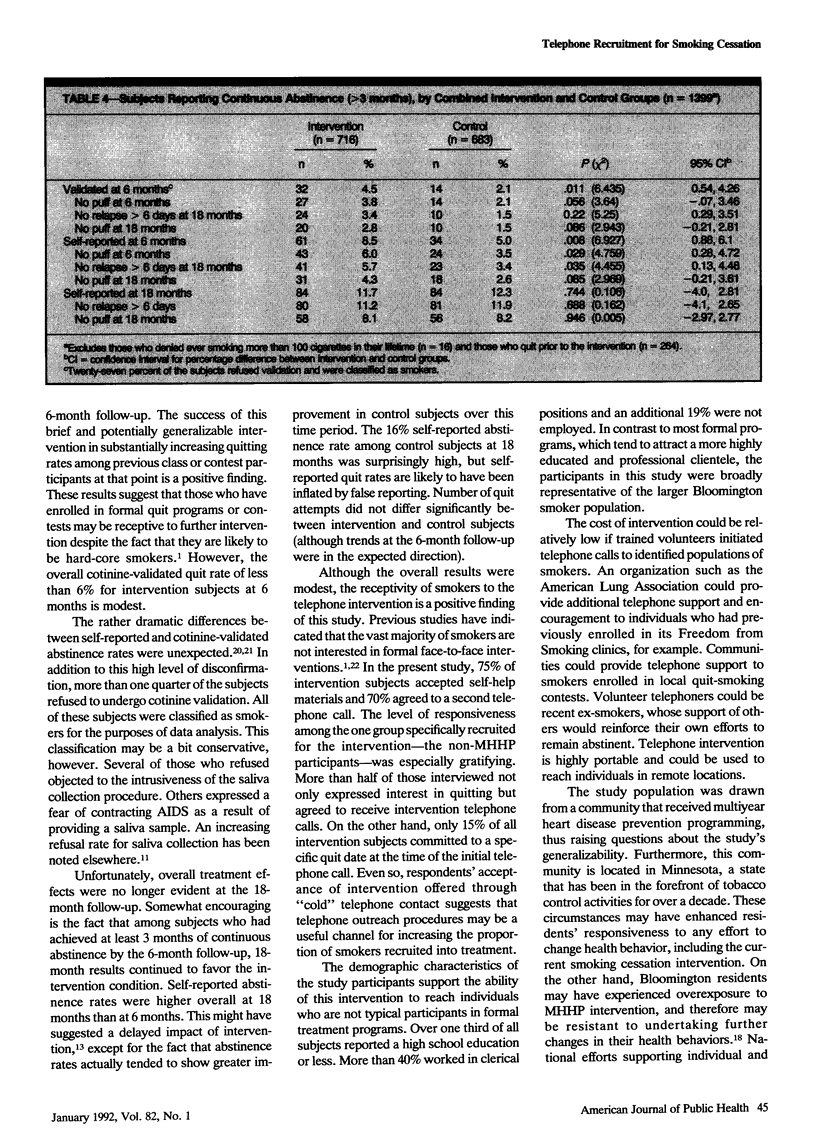
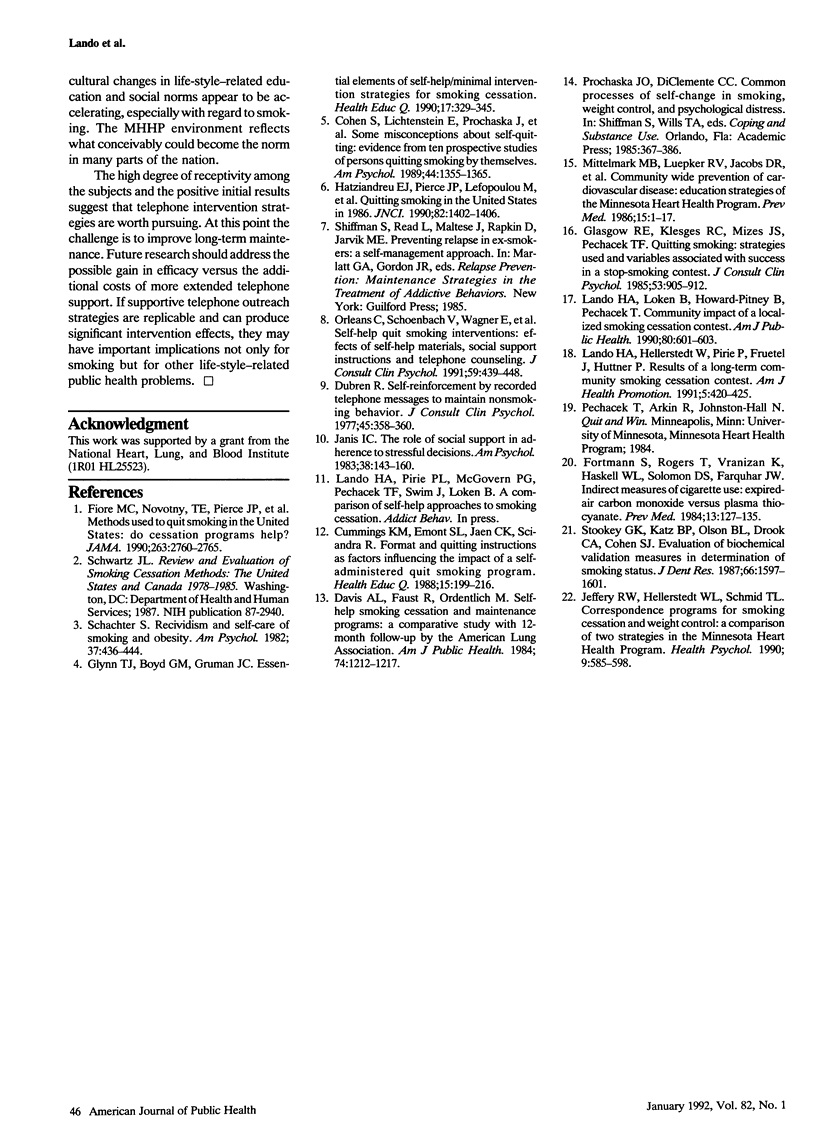
Selected References
These references are in PubMed. This may not be the complete list of references from this article.
- Cohen S., Lichtenstein E., Prochaska J. O., Rossi J. S., Gritz E. R., Carr C. R., Orleans C. T., Schoenbach V. J., Biener L., Abrams D. Debunking myths about self-quitting. Evidence from 10 prospective studies of persons who attempt to quit smoking by themselves. Am Psychol. 1989 Nov;44(11):1355–1365. doi: 10.1037//0003-066x.44.11.1355. [DOI] [PubMed] [Google Scholar]
- Cummings K. M., Emont S. L., Jaén C., Sciandra R. Format and quitting instructions as factors influencing the impact of a self-administered quit smoking program. Health Educ Q. 1988 Summer;15(2):199–216. doi: 10.1177/109019818801500205. [DOI] [PubMed] [Google Scholar]
- Davis A. L., Faust R., Ordentlich M. Self-help smoking cessation and maintenance programs: a comparative study with 12-month follow-up by the American Lung Association. Am J Public Health. 1984 Nov;74(11):1212–1217. doi: 10.2105/ajph.74.11.1212. [DOI] [PMC free article] [PubMed] [Google Scholar]
- Dubren R. Self-reinforcement by recorded telephone messages to maintain nonsmoking behavior. J Consult Clin Psychol. 1977 Jun;45(3):358–360. doi: 10.1037//0022-006x.45.3.358. [DOI] [PubMed] [Google Scholar]
- Fiore M. C., Novotny T. E., Pierce J. P., Giovino G. A., Hatziandreu E. J., Newcomb P. A., Surawicz T. S., Davis R. M. Methods used to quit smoking in the United States. Do cessation programs help? JAMA. 1990 May 23;263(20):2760–2765. [PubMed] [Google Scholar]
- Fortmann S. P., Rogers T., Vranizan K., Haskell W. L., Solomon D. S., Farquhar J. W. Indirect measures of cigarette use: expired-air carbon monoxide versus plasma thiocyanate. Prev Med. 1984 Jan;13(1):127–135. doi: 10.1016/0091-7435(84)90045-8. [DOI] [PubMed] [Google Scholar]
- Glasgow R. E., Klesges R. C., Mizes J. S., Pechacek T. F. Quitting smoking: strategies used and variables associated with success in a stop-smoking contest. J Consult Clin Psychol. 1985 Dec;53(6):905–912. doi: 10.1037//0022-006x.53.6.905. [DOI] [PubMed] [Google Scholar]
- Glynn T. J., Boyd G. M., Gruman J. C. Essential elements of self-help/minimal intervention strategies for smoking cessation. Health Educ Q. 1990 Fall;17(3):329–345. doi: 10.1177/109019819001700308. [DOI] [PubMed] [Google Scholar]
- Hatziandreu E. J., Pierce J. P., Lefkopoulou M., Fiore M. C., Mills S. L., Novotny T. E., Giovino G. A., Davis R. M. Quitting smoking in the United States in 1986. J Natl Cancer Inst. 1990 Sep 5;82(17):1402–1406. doi: 10.1093/jnci/82.17.1402. [DOI] [PubMed] [Google Scholar]
- Janis I. L. The role of social support in adherence to stressful decisions. Am Psychol. 1983 Feb;38(2):143–160. doi: 10.1037//0003-066x.38.2.143. [DOI] [PubMed] [Google Scholar]
- Jeffery R. W., Hellerstedt W. L., Schmid T. L. Correspondence programs for smoking cessation and weight control: a comparison of two strategies in the Minnesota Heart Health Program. Health Psychol. 1990;9(5):585–598. doi: 10.1037//0278-6133.9.5.585. [DOI] [PubMed] [Google Scholar]
- Lando H. A., Hellerstedt W. L., Pirie P. L., Fruetel J., Huttner P. Results of a long-term community smoking cessation contest. Am J Health Promot. 1991 Jul-Aug;5(6):420–425. doi: 10.4278/0890-1171-5.6.420. [DOI] [PubMed] [Google Scholar]
- Lando H. A., Loken B., Howard-Pitney B., Pechacek T. Community impact of a localized smoking cessation contest. Am J Public Health. 1990 May;80(5):601–603. doi: 10.2105/ajph.80.5.601. [DOI] [PMC free article] [PubMed] [Google Scholar]
- Mittelmark M. B., Luepker R. V., Jacobs D. R., Bracht N. F., Carlaw R. W., Crow R. S., Finnegan J., Grimm R. H., Jeffery R. W., Kline F. G. Community-wide prevention of cardiovascular disease: education strategies of the Minnesota Heart Health Program. Prev Med. 1986 Jan;15(1):1–17. doi: 10.1016/0091-7435(86)90031-9. [DOI] [PubMed] [Google Scholar]
- Orleans C. T., Schoenbach V. J., Wagner E. H., Quade D., Salmon M. A., Pearson D. C., Fiedler J., Porter C. Q., Kaplan B. H. Self-help quit smoking interventions: effects of self-help materials, social support instructions, and telephone counseling. J Consult Clin Psychol. 1991 Jun;59(3):439–448. doi: 10.1037//0022-006x.59.3.439. [DOI] [PubMed] [Google Scholar]
- Schachter S. Recidivism and self-cure of smoking and obesity. Am Psychol. 1982 Apr;37(4):436–444. doi: 10.1037//0003-066x.37.4.436. [DOI] [PubMed] [Google Scholar]
- Stookey G. K., Katz B. P., Olson B. L., Drook C. A., Cohen S. J. Evaluation of biochemical validation measures in determination of smoking status. J Dent Res. 1987 Oct;66(10):1597–1601. doi: 10.1177/00220345870660101801. [DOI] [PubMed] [Google Scholar]


